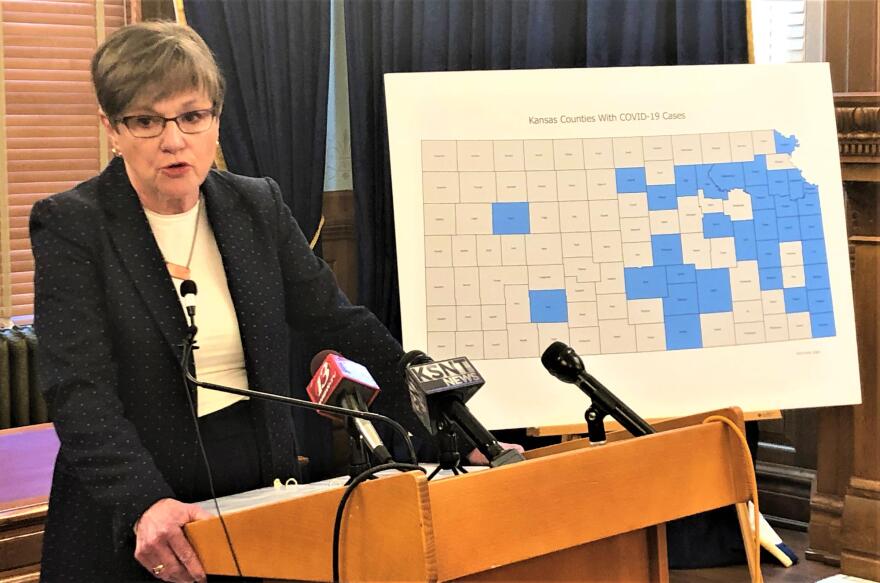TOPEKA — Kansas can’t help at least half of the struggling small businesses seeking relief because of the coronavirus pandemic, officials said Monday, calling for additional federal aid as the state reported another record for new coronavirus cases.
Democratic Gov. Laura Kelly and state Commerce Secretary David Toland announced that nearly 2,000 small businesses, most with 10 or fewer employees, had received grants financed with federal funds to help them cover operating costs. Kelly’s office said the grants totaled $37.5 million. Toland said the state hopes to distribute another $20 million to about 1,000 additional businesses by year’s end.
But Toland said about 6,000 businesses applied for grants, meaning at least half won’t get funds unless Congress approves another coronavirus relief package. Kelly called for more federal aid only hours after state Department of Health and Environment data showed Kansas averaging a record 2,741 new confirmed and probable coronavirus cases a day for the seven days ending Monday, or 7.4% higher than the previous high of 2,553 cases per day for the seven days ending Friday.
Kelly kept a statewide stay-at-home order in place for five weeks, ending in early May, to curb the virus’ spread. The Republican-controlled Legislature later forced her to accept giving local officials control over mask mandates, limits on public gatherings and restrictions on businesses. Some of the state’s 105 counties have enacted stricter rules this month, with part of Kansas City area getting tougher Monday.
"We have a real crisis on our hands in terms of public health," Kelly said during a Zoom news conference. "But one of the other things that we’ve been doing while we’ve been dealing with the public health aspect is dealing with the economic health aspect of this virus."
Republican legislators and conservative groups have criticized Kelly over her handling of the pandemic arguing that restrictions this spring were unnecessary in many rural areas. She’s had to publicly pledge not to shut down businesses statewide again to get legislative leaders to keep a state of emergency in place for the pandemic.
Meanwhile, talks in Washington have been stalled for months over another coronavirus relief package. Like other Democrats, Kelly favors a larger package that includes aid to states and cities to offset their revenue shortfalls. She argued Monday that they need to preserve spending on public safety, public health and core government services. But, she said, extra aid to small businesses is equally important.
But U.S. Senate Majority Leader Mitch McConnell wants a narrower package. Congressional Republicans also have said they don’t want a federal "bailout" of some states' and cities' poor budget decisions.
State Sen. Richard Hilderbrand, a Galena Republican serving on a joint legislative committee on the recovery, said the state should make sure that it’s spending existing relief funds as effectively as possible before asking for more.
He added, "I’d rather Washington lower our taxes instead of giving us money back."
The state health department added 7,234 confirmed and probable coronavirus cases since Friday to the state’s tally for the pandemic, increasing it 6.3% to 122,741. The department also reported another 10 COVID-19-related deaths over three days, bringing the total to 1,266 since the pandemic reached the state in early March.
The state has reported 19,188 new coronavirus cases since Nov. 9. That’s the equivalent of one in every 152 residents testing positive.
The state also averaged a record 42 new COVID-19-related hospitalizations for the seven days ending Monday, beating the previous high of 38. The health department reported 104 new hospitalizations since Friday, to bring the pandemic total to 4,431.
At least nine counties have enacted tougher coronavirus rules within the past two weeks, with leaders in Wyandotte County in the Kansas City area on Monday joining leaders in neighboring Jackson County, Missouri, in limiting public gatherings to 10 people, ordering bars, taverns and restaurants to close at 10 p.m. and limiting those businesses to 50% of their capacities, starting Friday.
Wyandotte County previously had limited gatherings to 45 people and didn’t have earlier closing times or a specific capacity limit. But the state health department said it has had more than 1,100 new cases during the past two weeks, increasing its pandemic total by 12.6% to nearly 10,000.
"We’re reaching a point where we have to take some stronger steps to help prevent it from getting even worse," said Janell Friesen, a spokeswoman for the county health department.
In neighboring Johnson County, the state’s most populous county, total cases have risen 33% in the past two weeks, up nearly 5,500 to almost 22,000, according to the state health department. There, the Shawnee Mission school district, one of Kansas’ largest, announced that middle and high school students would switch Nov. 30 from going to in-person classes two days a week to only online classes.




